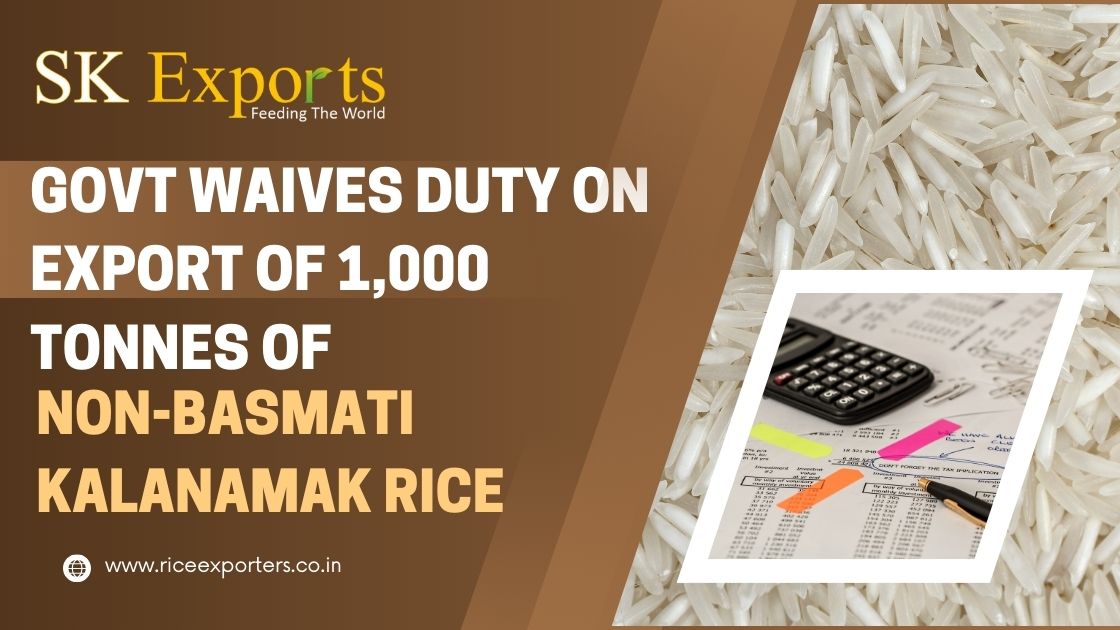In a significant move to bolster India’s agricultural exports, the government has recently announced the waiver of duty on the export of 1,000 tonnes of non-basmati kalanamak rice. This decision comes as a boon for farmers and exporters alike, opening up new opportunities in the global market for this unique variety of rice. Let’s delve into the details of this development and its implications for the agricultural sector.
The Significance of Kalanamak Rice in India’s Culinary Heritage
Kalanamak rice, renowned for its distinct aroma, unique taste, and nutritional value, holds a special place in India’s culinary heritage. Grown primarily in the fertile lands of the northern states such as Uttar Pradesh and Punjab, this heirloom rice variety has been cherished for generations. However, despite its exceptional qualities, the export potential of kalanamak rice has remained largely untapped due to various regulatory constraints.
The rich history and cultural significance of kalanamak rice contribute to its appeal both domestically and internationally. Historically, kalanamak rice has been prized for its medicinal properties and is often used in traditional Ayurvedic remedies. Its cultivation is deeply intertwined with local customs and festivals, making it an integral part of the cultural fabric of the regions where it is grown.
| Properties | Description |
|---|---|
| Aroma | Distinct aroma, often described as nutty or earthy, enhances the flavor of dishes. |
| Taste | Unique flavor profile, slightly sweet with hints of floral notes, highly prized by connoisseurs. |
| Nutritional Value | Rich in essential nutrients such as carbohydrates, proteins, vitamins, and minerals, promoting health and wellness. |
Government Initiative: Waiver of Export Duty on Non-Basmati Kalanamak Rice
The government’s decision to waive duty on the export of 1,000 tonnes of non-basmati kalanamak rice marks a significant step towards unlocking the global market for this premium rice variety. By eliminating export duties, the government aims to make Indian kalanamak rice more competitive in the international market, thereby boosting exports and enhancing farmers’ incomes.
This move is part of a broader agenda to promote agricultural exports and double farmers’ income by 2022. With agriculture being a crucial pillar of the Indian economy, initiatives aimed at enhancing farmers’ access to global markets play a pivotal role in driving rural prosperity and economic growth.
| Implications | Details |
|---|---|
| Increased Export Competitiveness | Removal of export duties enhances the price competitiveness of Indian kalanamak rice. |
| Market Diversification | Access to international markets allows for the expansion of the customer base. |
| Revenue Boost for Farmers | Higher remuneration for farmers leads to increased incomes and improved livelihoods. |
Implications of the Export Duty Waiver
The waiver of export duty on non-basmati kalanamak rice is expected to have several positive implications for the agricultural sector and the economy at large:
- Increased Export Competitiveness: With export duties removed, Indian exporters can offer kalanamak rice at more competitive prices in the global market, thereby attracting more buyers and expanding market share.
- Market Diversification: Access to international markets provides Indian farmers and exporters with opportunities to diversify their customer base and reduce dependence on domestic demand fluctuations.
- Revenue Boost for Farmers: By tapping into the global market for kalanamak rice, farmers stand to gain higher remuneration for their produce, leading to increased incomes and improved livelihoods.
- Promotion of Agro-Biodiversity: Supporting the export of indigenous rice varieties like kalanamak encourages the preservation of agro-biodiversity and contributes to the conservation of traditional farming practices.
- Enhanced Rural Development: Increased agricultural exports translate into greater economic activity in rural areas, fostering rural development, job creation, and overall prosperity.
| Implications | Details |
|---|---|
| Increased Export Competitiveness | Removal of export duties enhances the price competitiveness of Indian kalanamak rice. |
| Market Diversification | Access to international markets allows for the expansion of the customer base. |
| Revenue Boost for Farmers | Higher remuneration for farmers leads to increased incomes and improved livelihoods. |
| Promotion of Agro-Biodiversity | Preservation of indigenous rice varieties contributes to agro-biodiversity conservation. |
| Enhanced Rural Development | Increased economic activity in rural areas fosters development, job creation, and prosperity. |
Sustainable Practices in Agricultural Production and Trade
While the waiver of export duty on non-basmati kalanamak rice is undoubtedly a positive development, it is essential to ensure sustainable practices in agricultural production and trade. This includes promoting organic farming, ensuring fair prices for farmers, and maintaining quality standards to uphold India’s reputation as a reliable supplier of agricultural commodities.
Moreover, concerted efforts are needed to harness the full export potential of kalanamak rice by addressing infrastructural bottlenecks, streamlining export procedures, and investing in marketing and branding initiatives to create awareness about this premium rice variety in international markets.
Leveraging India’s Rich Agricultural Heritage for Global Market Access
In conclusion, the government’s decision to waive duty on the export of 1,000 tonnes of non-basmati kalanamak rice is a welcome move that holds promise for India’s agricultural sector. By leveraging India’s rich agricultural heritage and tapping into the global demand for premium rice varieties, this initiative paves the way for greater prosperity for farmers, increased agricultural exports, and sustainable rural development.
